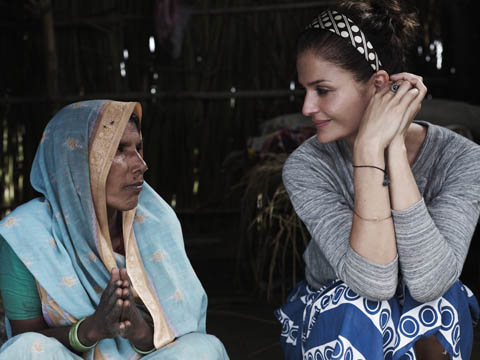
Scott Weiner/Calvin Klein Cosmetics
If recent food price rises have families in shock, Oxfam has a worse outlook in the next 20 years if urgent action is not taken to change the system, says the charity charged with fighting global poverty.
Oxfam’s Growing a Better Future report forecasts that maize and other key staples will rise in price by between 120 and 180 per cent by 2030, with up to half due to climate change. The world’s poorest, who spend up to 80 per cent of their income on food, will be hit hardest.
Supporters of Oxfam’s latest campaign include Archbishop Emeritus Desmond Tutu, actress Scarlett Johansson, and former president Lula Luiz Inácio Lula da Silva of Brazil.
Oxfam says the world will hit a crisis point as the planet’s natural resources are depleted, and millions more hungry people will be created. Already eight million people face chronic food shortages in east Africa. By 2050, demand for food will rise 70 per cent, yet the capacity to increase food production is declining. The average growth rate in agricultural yields has almost halved since 1990, ‘and is set to decline to a fraction of one per cent in the next decade,’ says Oxfam.
‘In more than half of industrialized countries, 50 per cent or more of the population is overweight, and the amount of food wasted by consumers is enormous—quite possibly as much 25 per cent,’ the charity adds.
‘Our world is capable of feeding all of humanity yet one in seven of us are hungry today,’ says Jim Clarken, CEO of Oxfam Ireland. ‘Millions more men, women and children will go hungry unless we transform our broken food system.’
His counterpart in New Zealand, Barry Coates, executive director of Oxfam New Zealand, echoes this view: ‘The food system needs to serve the interests of the seven billion of us who produce and consume food, rather than the interests of big agribusiness and powerful élites.’
The crisis is, in part, driven by globalized corporations. Three companies—Archer Daniels Midland, Bunge and Cargill—control an estimated 90 per cent of the world’s grain trade. Their activities help drive volatile food prices and they profit from them, according to Oxfam. In the first quarter of 2008, at the height of a global food price crisis, Cargill’s profits were up 86 per cent.
Small farms could lead the renaissance in feeding the world, if given the right investment and market access, says the Oxfam report.
Johansson says, in her statement, ‘Sharing food is one of life’s pleasures. On a global scale, we don’t share fairly. Close to a billion people go to bed hungry every night. The fact is: the global food system is a broken one. All of us, from Kentucky to Kenya, deserve enough to eat. That’s why I’m joining Oxfam’s Grow campaign.’







